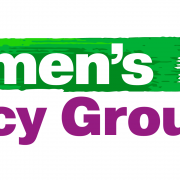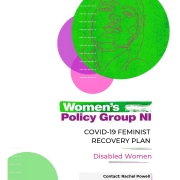On the evening of the 2nd June 2020, a DUP motion and Sinn Féin amendment on restricting abortion were debated in the Northern Ireland Assembly. The DUP’s motion was to ‘reject the imposition of abortion legislation which extends to all non-fatal disabilities, including Down’s syndrome’. The Sinn Féin amendment was to leave out all after ‘reject’ and insert: ‘the specific legislative provision in the abortion legislation which goes beyond fatal foetal abnormalities to include non-fatal disabilities, including Down’s syndrome’. The Sinn Féin amendment fell with 32 AYEs and 52 Nos. The DUP motion was carried with 46 AYEs and 40 Nos. You can read the full debate here; read the voting of MLAs on the amendment here and you can see the voting record of each MLA on the motion here. Whilst this motion does not directly change the NIO Abortion Regulations that were due to be implemented on 31st March, this is extremely worrying for a number of reasons.
First of all, the DUP motion itself is bad enough in it’s thinly veiled use of disability as a means of restricting bodily autonomy for women and pregnant people. As a disabled woman, this was an extremely distressing debate to watch, especially as this was the most that I have ever heard disability being mentioned in the Assembly and it was only in the context of limiting hard-won reproductive freedoms. Speakers from the DUP, UUP, SDLP and Alliance party spoke of their intent to support the motion with some of the most condescending descriptions of disabled people I have ever come across in my lifetime. Disabled people were described as being “treated poorly” because of “their imperfections” rather than due to entrenched systemic discrimination; this in itself shows the ignorance towards disability activism by the speakers in question. Not once did any of these members discuss the history of parties in the Executive stripping away the human rights of disabled people through their support of welfare reform and austerity; nor did any of these members once consider the needs of disabled women themselves who face even greater barriers to accessing much needed reproductive healthcare.
Secondly, the Sinn Féin amendment to the motion was a disappointing for a number of reasons. The fact that more effort was put in by Sinn Féin to restrict abortion access further, rather than fight to implement what we were supposed to have implemented by now, is unbelievably disappointing. Hundreds of activists pleaded with the party to #DropTheAmendment to absolutely no avail. Had the party focused on voting down the DUP motion, rather than defending their own anti-choice amendment, we may be in a different position today. Most significantly, Sinn Féin MLAs responded to emails asking them to drop the amendment by stating that they “do not support CEDAWs recommendation to provide abortion in the case of severe fetal [sic] impairment”. This has been raised with Mary Lou McDonald, and no response has been given on why the party felt the need to put their own party policy above a human rights inquiry into our abortion laws from experts on discrimination against women. In addition to this, the UN CEDAW committee described our abortion legislation in Northern Ireland as a form of gender-based violence that is cruel, inhumane and could be considered as a form of torture. So we need to know why it was considered reasonable for a self-proclaimed “pro-choice” party to introduce an amendment that would cause women and pregnant people to be forced to travel to England to access healthcare when in a situation of extreme distress?
This is not just about the DUP and Sinn Féin though. The blame needs to be shared with the majority of the SDLP and UUP (and an Alliance party MLA) that supported the horrific motion in question; actions that portray why a conscience vote should not be applied to a human rights and medical issue. Whilst the comments and support from both the Alliance party’s Paula Bradshaw and SDLP’s Matthew O’Toole were welcomed, particularly in how they highlighted that the right to choose in such a difficult situation should not be for legislators to decide, what is the use of this when other members of these parties vote against reproductive freedom? An international inquiry highlighted the vast human rights violations that were happening to women and pregnant people in Northern Ireland, but some members of the SDLP, UUP and Alliance party still think we should uphold these human rights violations because of their own personal conscience? At what point to we continue to wait for “change from within” each party, especially those that describe themselves as advocating for civil rights and equality? Why do we allow the individual conscience of MLAs put women and pregnant people through torture, trauma and distress?
Most significantly, I want to address the view that Northern Ireland is incapable of being allowed to lead the way when it comes to modern legislation. Why do we need to have the worst aspects of the 1967 Act and the abortion provisions in the Republic of Ireland added to our own regulations here? Why is it not possible to learn lessons from other areas that gained access before us, to assess what we need to do better to ensure an accessible provision that is fit for purpose? In relation to the specific use of disability in this context, clarification is needed that unfortunately was not provided in the debate in the Assembly. For those who are in the heart-breaking position of facing a foetal abnormality, it is extremely unlikely that a doctor can give a clear fatal diagnosis. Instead, you will be told the nature of the anomaly, the consequences of this, the survival rate of the condition and other reasons that this rate could be lowered. The term ‘fatal foetal abnormality’ has had an extremely narrow criteria attached to it, and as a result, many Irish women are forced to travel to Great Britain to access an abortion. It is for this reason, that I can never understand why a party would introduce such an amendment and claim to be pro-choice. Both the Green Party’s Clare Bailey and People Before Profit’s Gerry Carroll brought reason to the debate, called out the contempt for women coming from parties, and attempted to bring up medical facts; but, unfortunately, this was a small proportion of the overall debate whilst the Executive parties talked at great, repetitive length.
A much-broader discussion of how disability is treated in Northern Ireland needs to be had and the debate held was Stormont is a far, far way from how the disabled community deserves to be treated. We, as a society, need to make a total cultural shift to how disabled people are treated. That includes our fair access to healthcare, education, housing, social benefits, human rights, and a life free from stigma. Disabled people across the UK have begged both the Westminster government and the NI Assembly to not implement welfare reform, and despite the new-found disability activism from certain parties, our pleas were ignored and thousands of disabled people died as a result. Where was the concern for our lives then? Why do certain parties only discuss disability when it is in the context of restricting our right to choose? Why have our voices not been listened to in the past but suddenly certain parties became our apparent advocates overnight? It is not good enough, and we should never be used as a political football. The sham of a debate last night is already being used in Westminster to try and further prevent the implementation of the abortion services that were due on the 31st March. We must continue to fight this, every step of the way, until we get the rights we deserve that should have been implemented a long, long time ago.
I am a disabled woman and I will always support the right to choose. I am a disabled woman and I want to see all parties put actions behind their words and scrap all discriminatory policies they have introduced in the past decade that have killed many disabled people. I am a disabled woman and I am sick of us not being included in debates about disability. We are a broad community, with a diverse range of views, please do not only use disability when it suits your agenda. Don’t be deflated, be determined.
#StopExportingTragedy







